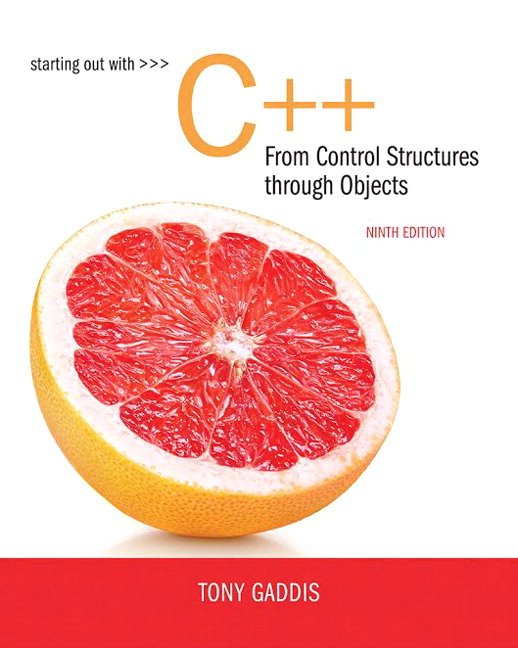CS 110A Introduction to Programming: C++
Spring 2018
- For more information about online courses go to http://www.ccsf.edu/online/courses
- RAM ID Login Instructions
- If you have questions about taking online courses, start by reading the Distance Learning Frequently Asked Questions.
- To find out if online learning is for you, consider taking this short self evaluation.
- Canvas Student Guide
Upon completion of this course, students will be able to:
- SLO #1 - Write and predict the results of C++ code using standard input and output, and with files. Test and debug such programs.
- SLO #2 - Write and predict the results of C++ code with numeric and Boolean expressions, if -statements and loops, including nested control structures.
- SLO #3 - Design, write and predict the results of C++ code using functions that have parameters (both call by reference and call by value) and return values.
- SLO #4 - Design and develop C++ code to process arrays.
 Required Textbook:
Starting Out with C++: From Control Structures through Objects, 9th Edition.
Required Textbook:
Starting Out with C++: From Control Structures through Objects, 9th Edition. By Tony Gaddis ISBN-13: 9780134498379 I post additional notes for this class.
Programming assignments are another essential part of this course. There will be twelve programming assignments total throughout the semester. For each assignment, students are expected to analyze the problem as well as design and implement the algorithm by coding it into a Java program. Assignments focus on one or more of the learning objectives.
This course allows Pass/No Pass grading. Check the official calendar for the deadline to make this choice. Your final grade is determined by points you earn in the following areas:
Submission |
Total Points |
Percentage % |
Programming Assignments & Labs |
500 |
50% |
Two Midterm Exams |
300 |
30% |
Final Exam |
200 |
20% |
TOTAL |
1000 |
100% |
Grading Scale:
| % of Points | Letter Grade |
90 – 100 |
A |
80 – 89 |
B |
70- 79 |
C |
60 – 60 |
D |
< 60 |
F |
Fail/Withdraw |
FW |
You must log in to Canvas each week, read the lab assignment and complete the lab work before the next on-campus class. Lab work is a graded portion of this class. A lab assignment will be posted in Canvas each week that should take approximately 2-5 hours to complete. Lab exercises will be listed under "Quizzes" in Canvas. Laboratory exercises are short and simple exercises designed to introduce a new topic. There will be five online labs that supplement each online learning module. These laboratory exercises contain short programming assignments. Unlike assignments, late submissions will NOT be accepted for labs. Lab topics are announced in the schedule. Lab exercises can be completed using all of the available resources.
Midterm Exam 1: This is an online exam scheduled
on Friday, March 2nd, 2018.
Midterm Exam 2: This is an online exam scheduled
on Friday, April 13th, 2018.
Final Exam: Wednesday May 16, 2018.
There are two online exams and they are all required to be taken by the deadline. These exams will be available for exactly 18 hours, starting 6:00 AM on the due date and closing at midnight. You must take the exams within that 18-hour period.
The final exam is required and must be taken in person.
There are weekly programming assignments that assigned every Monday and due by the following Monday at 11:59 PM unless specified otherwise. Programming assignments will be accepted up to four days past the original due date. They will be considered late and will receive a 10% deduction, with no exceptions. For example, if a programming assignment is due on Monday at 11:59 PM, it can be turned in by 11:59 PM on Friday.
Since this is an online course that utilizes discussion forums, it is important for all students to participate in the course promptly actively. The Canvas Forum is the main place for our class discussion. You can ask questions regarding course materials, assignments, and exams on the forum. Students are expected to participate in all discussions. Please consider the following general participation expectations:
- Login regularly and actively participate in the course activities.
- Post discussion forums and other assignments on time as indicated each week.
- Complete the assigned reading before posting your question(s) — answers to most questions can be found in the reading assignments.
- No code sharing is allowed on the forums.
Think of these forums as our online classroom. The forums on the website are a good way of interact with other students, exchange thoughts, ask and answer questions as well as take part in the public discussion. I will check the weekly forums on a daily basis and will respond to questions as needed. I also highly encourage students to read and respond to posts from fellow peers. You must also post an introduction within the first week to avoid being dropped as a no-show.